 It’s all been happening out here, in the fresh air. After spending too much time besotted with our digital screens, many of our pixelated brains are becoming nostalgic about the good times of climbing trees and making mud pie. According to recent research from the National Trust, today's children are now suffering from a modern phenomenon coined as ‘Natural Deficit Disorder’, because their generation is more familiar with touch screens than with soil, plants and bugs. It’s no wonder we’re all reaching for tents, waterproofs, and camping stoves in our desire to reconnect with the outdoors, and reap nature’s reward of good health and wellbeing!
It’s all been happening out here, in the fresh air. After spending too much time besotted with our digital screens, many of our pixelated brains are becoming nostalgic about the good times of climbing trees and making mud pie. According to recent research from the National Trust, today's children are now suffering from a modern phenomenon coined as ‘Natural Deficit Disorder’, because their generation is more familiar with touch screens than with soil, plants and bugs. It’s no wonder we’re all reaching for tents, waterproofs, and camping stoves in our desire to reconnect with the outdoors, and reap nature’s reward of good health and wellbeing!
- Introduction - the 'Leave No Trace' Manifesto
- How to Camp Green
- What To Pack
- Responsible Camping Activities
- Handy Information and Safety
- Sources
Why eco camp?
Camping is cheaper and greener way to escape than jetting off abroad. In 2015, GB residents took 15.4 million camping and caravanning holidays in the UK, spending a total of 64.7 million nights in tents, tipis, motorhomes, caravans and glamping equivalents! (source GBTS). Domestic travel grew by 11% from 2014 – the ‘staycation’ favoured for less travel time and cheaper costs overall.
However, in our weekend stampede to the countryside and coastlines, our beloved is left trampled and littered in our wake. In this resource on green and responsible camping, we offer some basic rules, tips, and useful advice to help you minimise the environmental impact of your pitch in the wild, and help preserve the unspoiled beauty of the British countryside as a happy, responsible camper.
The 'Leave No Trace' Manifesto
The Golden Rule of happy camping is to leave your camping spot as you found it, and we’re not talking about somehow fluffing up the grass you’ve been flattening in your sleep. The 'Leave No Trace' mantra is employed across the globe to promote responsible enjoyment of the outdoors; that is enjoying the outdoors without affecting the local environment in a negative way. Practicing the 'Leave No Trace' ethic is the simple and effective way to green your camping trip.
Here are 'The Seven Principles', which you should stick to as your eco-friendly, outdoor commandments.
The Seven Principles:
Plan Ahead and Prepare
Travel and Camp on Durable Ground
Leave What You Find
Dispose of Waste Properly
Respect Wildlife and Farm Animals
Minimise the Effects of Fire
Be Considerate of Others
How to Camp Green
There are roughly four types of camping you can embark on; Wild Camping, Campsite Camping and Caravanning, Festival Camping and Glamping. Each type of camping comes with its own considerations, so it’s always best to research the site of your proposed camping spot, and follow the seven principles of the 'Leave No Trace' manifesto no matter where you pitch up.

To really connect with the natural environment, wild camping is for the real primal adventurists. Wild Camping demands reliable gear, good knowledge of camping practices and often map reading and orienteering. Only legal in Scotland and Dartmoor, the best practice to camp in the rest of the UK is to arrive late and leave early, or ask the landowner’s permission. Failing that, follow the leave no trace commandments, and avoid lighting an open fire to keep on the right side of the locals.
The Basics:
- Find reliable new or second-hand camping gear from trusted outdoor brands
- Solar-powered gadgets
- Wood-fuelled stove
- Stay on the trail as much as possible
- Camp on hard-wearing ground
- Build a safe campfire and dispose of the ashes correctly
- Use eco-friendly toiletries
- Leave your campsite as you found it (rubbish-free!)
- Do your business responsibly

Probably the most popular and affordable choice with campers, both new and seasoned. Paying for a pitch on a campsite for a tent, camper van or caravan will ensure you have your own space on prepared and maintained ground, with access to a water supply, toilets and quite often showers. Campsite camping is a great way to enjoy the outdoors, with the benefits of good rubbish disposal, clean water, and more often than not - a bunch of friendly, seasoned campers to befriend.
The Basics:
- Respect campsite rules
- Use the recycling facilities provided
- Avoid open fires and disposable barbecues which could damage the ground
- Use reusable dishes, kitchen utensils and pans
- Minimise the use of gadgets, chargers, and batteries - you’re looking for an escape to outdoors after all!

We think you’ll agree, festival camping is perhaps the most wasteful type of camping. It’s often less about the camping, and more about the music, people and activities at the festival which lead you there with a budget pop-up tent and blow-up mattress in tow. To be an eco-friendly festival camper, we advise you to follow a few simple guidelines to keep it responsible in the midst of the party!
The Basics:
- Locate your campsite stewards and rubbish points on arrival
- Keep your camp clean and tidy
- Take all your camping gear home with you
- Use the loos provided
- Bring wellies and waterproofs
- Use property lock-ups to keep your valuables safe

Camping’s luxurious sibling - glamping is for those of you who want to get outdoors without ‘roughing it’. The hardy campers turned their noses up when this new kid turned up on the UK camping scene in 2005, but quite frankly, they don't know what they're missing! From yurts and cabins to treehouses and pods, glamping can come in all shapes sizes, and is an excellent way to take your walk on the wild side, with a G&T in hand. It’s camping with a real woodburner stove, a roof sheltering you from whatever the British weather may throw at you, and maybe even a fridge to keep your cocktail ingredients ice cold - ready to shake up when it’s 5 o’ clock somewhere!
The Basics:
- Choose energy-efficient eco camps, pods and huts
- Use local produce in glamp meals, it’s often tastier anyway!
- Cut down on your carbon footprint and find a secret glamping hideaway near you
- Keep activities simple and local, when was last time you played chess or went stargazing?
Planning Your Green Camping Trip
It’s no secret that an eco-friendly camping trip isn’t only a fulfilling holiday or weekend activity, but also an affordable option for a staycation. By planning ahead, you can get your share of the adventure, save money and come back fit to bursting with fresh air. To lower your carbon footprint, consider rural hideaways closer to home to lower travel times, or use public transport.
Eco Camping in the UK
There are of course thousands of camping, glamping, caravanning and festival sites, ranging from the luxurious to the remote, scattered all over Great Britain. Here just a few ideas, to flick the switch, get the ideas whirring and the plans unfolding to lead you off on a greener, cheaper holiday.
What to Pack
Wild campers and walkers thinking about pitching up in different places over the course of your trip, you know you need to pack light. Your trip will be ruined by a heavy rucksack, so do some trial packs and walk up and down your road to double check the weight is comfortable and supported properly. Caravanners and Glampers can afford to be a little more frivolous with clothes, utensils and gear, although camping gadgets and essentials which come with nifty cleaning, storage and charging functions are recommended. Be sure to check out the likes of Cotswold Outdoor, Go Outdoors, Millets, Mountain Warehouse and Blacks for bargains on those camping essentials.
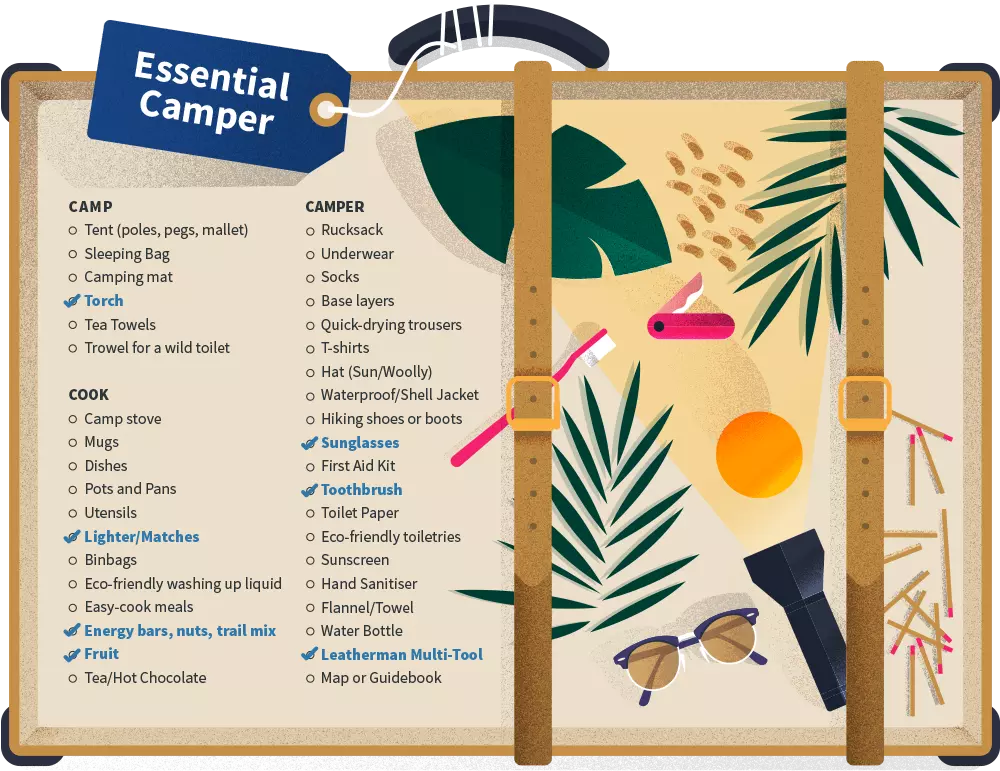
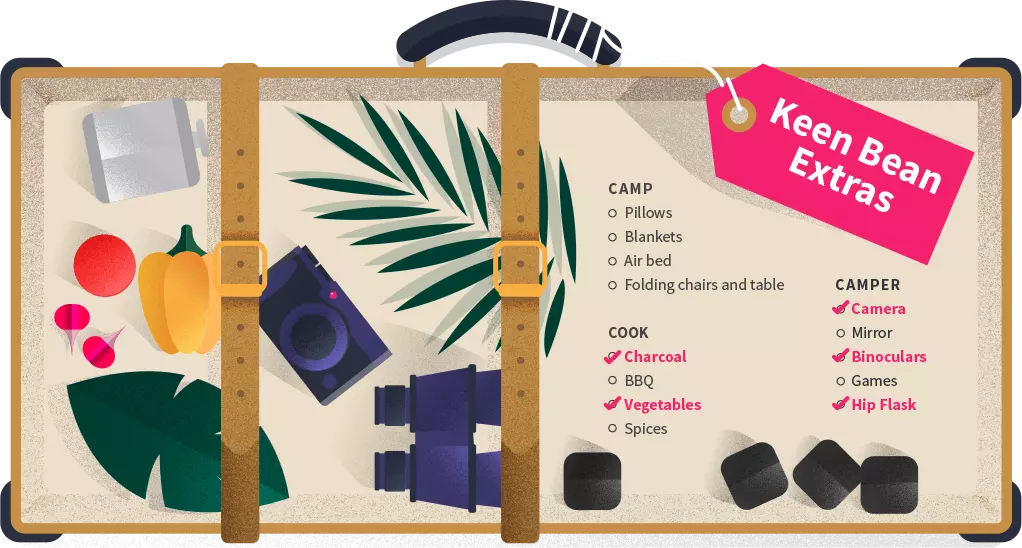
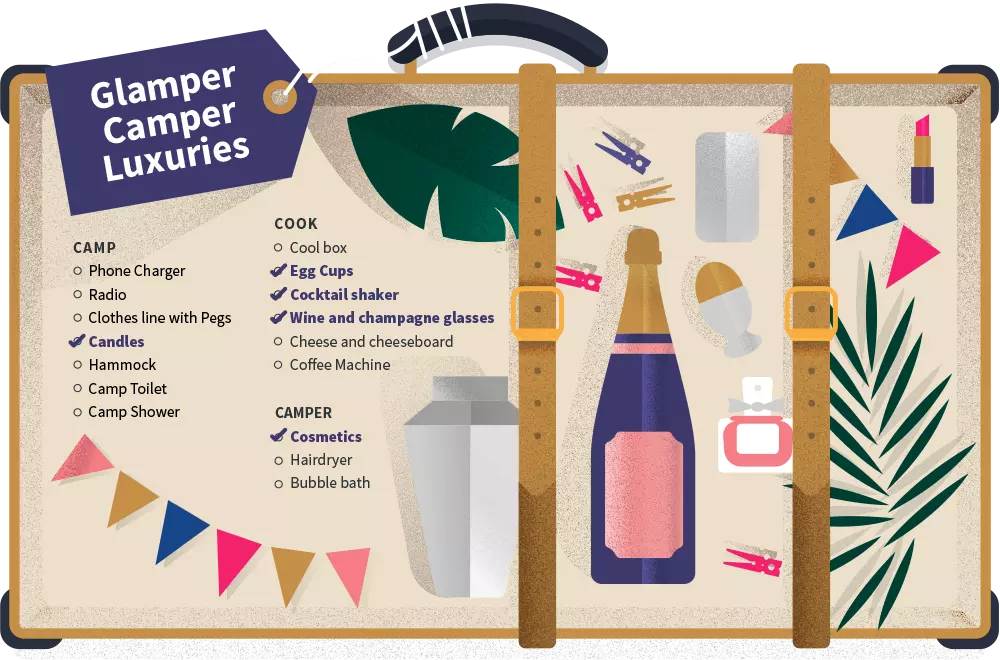
Eco-Friendly Camping Gear
Despite our love of green spaces and nature, tis a sad fact that outdoorsy types contribute heavily to toxic waste; with outdoor clothing and gear designed to stand up against the weather typically made with synthetic chemicals. In January 2016, Greenpeace tested 40 products from leading outdoor brands for PFC (perfluorinated compounds) and found that 36 of them contained these toxic chemicals. You can do your bit, and shop for sustainable green gear from companies who are working hard to reduce their impact on the planet while providing active individuals the reliability they need from their kit.
There is the urge - in your bid for adventure - to buy all the kit and gadgets you can your hands on, but if you’re off eco-camping for the first few times, don’t splash the cash on excessive bits of kit. Quite often, you’ll figure out what you need on your adventures, so don’t be tempted to head out into the wilderness with all the gear and no idea!
Hand-me-Greens
Second-hand gear is often in nearly new condition, because there are always rucksacks, camping stoves and accessories which didn’t see more than one or two rugged adventures, and have lived in an under the stair cupboard ever since. Gumtree, eBay, and Preloved are excellent places to find second-hand gear at budget prices – saving your wallet and planet in one easy purchase!
Green Camping Choices
You’ll find a small selection of eco options at large outdoor stores including Go Outdoors, Millets, and Cotswold Outdoor. From bamboo bowls, plates and cutlery to tent brand Vango’s biodegradable tent pegs, there are small green choices which will contribute to a bigger, more responsible enjoyment of the outdoors for all.
Tents - Is camping in trees the answer to minimising your impact on the ground? Tentsile was founded by a Tarzan-type, who believed treehouses were more comfortable than sleeping on uneven ground, and better for the environment. These transportable tree tents offer shelter with no environmental impact, and have been quickly snapped up for camping outdoors and eco retreats everywhere. What’s more, every time you buy a tent, they’ll plant 3 trees with WeForest. A smart, versatile camping solution for all kinds of terrain, a Tentsile tent is not only practical, but all new kind of camping experience guaranteed to appeal to our childish side!
Stoves - Wild Stoves sell a comprehensive selection of backpacking and camping stoves with a small eco footprint, including BioLite CampStoves and a Wild Woodgas Stoves – all fuelled by wood.
Solar-Powered Gadgets - From the Gelert Solar-powered shower to solar-powered lamps and torches, many outdoor companies have created products to encourage you to leave your battery chargers at home, and let the power of the sun fuel your camping and caravanning activities.
Responsible Outdoor Clothing Brands
Many outdoor brands are on a mission to take responsibility for protecting our threatened planet, and manufacture greener gear for eco-minded campers. For new keen bean campers, we’ve provided an introduction to a few brands that are waving the flag for the green, clean and fair production of outdoor gear, plus a few tips on what to look for when it comes to shopping for environmentally-friendly camping kits.
VAUDE - A German brand with the famous German efficiency, VAUDE have been taking their move towards environmentally-friendly gear seriously since 2001, when they began working with bluesign® standard. They are the first outdoor brand to receive an EMAS (Eco-Management and Audit Scheme) Award, and a WWF cooperation partner. By manufacturing the gear with sustainable materials and fair partnerships, they have become the leading choice of outdoor gear for mountain and bike sports for responsible outdoor adventures.
Jack Wolfskin - The Germans are onto something – all of Jack Wolfskin’s German, Austria and Switzerland sites are 100% run on renewable energy. They too became a bluesign® partner in 2011, and are working to phase out PFCs to become 100% bluesign®. Their commitment to product design promises to provide outdoor wear which lasts for longer, so you can shop for durable, protective clothing for men, women and children, as well as tents, backpacks and sleeping bags.
Patagonia - Patagonia’s commitment to climate change is spelled out in their mission statement; “Build the best product, cause no unnecessary harm, use business to inspire and implement solutions to the environmental crisis”. Recognising the wild places we all enjoy in active pursuits such as climbing, cycling, trail running, and surfing are at risk in the future, Patagonia provides complete transparency across its supply chain to promote true corporate responsibility. They’ve been working with bluesign® since 2000, using textiles that minimise the impact of people and the environment from production. They have recently produced the first ever neoprene-free wetsuit, and regularly campaign to protect national parks and coastlines at risk of destruction.
Páramo - Páramo’s founding partnership with the Miqueline Foundation in 1992 created a brand with steadfast ethical principles, unwavering in their commitment to the local workers in Colombia and a low impact on the environment. Their long-running recycling scheme encourages customers to return their old Páramo for discount on a new one, and recent steps towards eliminating PFCs has led Páramo to become the first brand to take Greenpeace’s Detox Commitment. Manufacturing high performance waterproof outdoor gear, Páramo’s outdoor wear is designed to withstand the wear and tear of outdoor escapades.
Be The Change - Not sure if your preferred outdoor clothing brand is taking responsibility for the environmental effects of its supply chain? Look out for the Corporate Responsibility page on outdoor brands' websites, which will go into greater detail about what each brand does to work towards a fairer and more sustainable business model.
Low-impact Camping
If you’re off on a real camping adventure in the wilderness, it is important to consider local wildlife and ecosystems in the area. Camping in a wildflower meadow or on a river bank might be romantic, but flattening wild species will quickly throw all the good eco-planning and preparation you’ve done out the window. Minimise your impact on the environment by staying on the beaten path, leaving anything you find where you found it, and avoid using washing up liquid, soap and other cleaning products which contain chemicals.
Tips for treading lightly:
- Trek on paths
- Camp on solid ground
- Clear up all your rubbish
- Use biodegradable, eco-friendly soap
- Scatter your grey water in an arc
- Sprinkle fire ashes across a large area
Responsible Camping Activities
- Walking
- Wildlife Spotting
- Mountain Biking (on trails)
- Local Attractions
- Stargazing
- Campfire Games
Activities for the kids
- Nature Scavenger Hunt
- Den Building
- Hide and Seek
- Scrapbook Making
Wildlife Watching Tips
From fit and active hikers with a mountain peak to conquer to hopeful fishermen and wildlife watchers - we’ve all got different reasons for setting out on a camping adventure. If part of the call away from campsites and into the wild is the wildlife, we’ve got a few tips for budding enthusiasts to catch a glimpse of local species.
- When to go Watching -
Four Seasons - Hibernating animals are hidden away in the winter, and many animals will spend time building nests, digging new burrows or foraging for fruit and nuts at specific times of the year. Get to know your mammals, birds and insects inside out, and you’re sure to stumble upon them.
Early bird catches the worm - Animals are frequently active during the early morning or late evening, and you might even catch some nocturnal animals who are having a late day!
Rain or Shine - Stormy or bad weather may tempt you to stop your searching, but don’t let it! Animals can be particularly active before or after storms, so take shelter in the meantime, and wait out the weather.
- Where to go Looking -
Local Guides - Find local tourist guides online, whether you're going to Scarborough or the Wye Valley, tourist websites usually hold good insight into the local wildlife in the area. Countryfile is a great TV programme and online resource for avid wildlife watchers, offering information on seasonal hotspots and good spots for the locals in different parts of the country.
Think Habitat - The more experience you gain wildlife watching, the more you’ll be able to identify the right combination of food, shelter, and water.
- How to Look -
Patiently - Complacency is the battle to spotting wildlife. Quiet, active viewing over a period of time increases your chance of catching a glimpse. Sit still, or move very slowly - animal senses are often better than our own.
Mix it up - Look in a variety of ways. Use binoculars and scopes to magnify your vision, scan the whole landscape from right to left, left to right, and try not to focus on particular objects.
Use all of your senses - Use your eyes and ears and nose to immerse yourself in the environment, tuning into the musical backdrop of trickling streams, rustling leaves, and birdsong. You might just catch a whiff or noise of something before you see it!
- What to Look for -
Colour - A flash of colour through the trees could be the encouragement you’re looking for!
Clues - Look for animal tracks, trails and food remnants to give you an idea of where they might be eating, sleeping or just hanging out.
Movement - A rustle, a leap - animals are better than us at sitting still, it’s a survival trait. You might not spot them until they deem it to be safe to move on.
Shapes - If something looks a little strange, investigate! Animals are good at camouflage, but you might notice an odd tree branch or a pair of eyes poking out!
How To Build a Campfire
Nothing says hardy camper like a roaring fire, but responsible bushcraft and thorough extinguishing are an essential consideration to protect the natural wildlife and leave your spot in a pleasant state for fellow campers. Skip the fuel and channel your inner caveman, with our campfire tips to help you achieve lively flames to heat up some food, a brew and you!

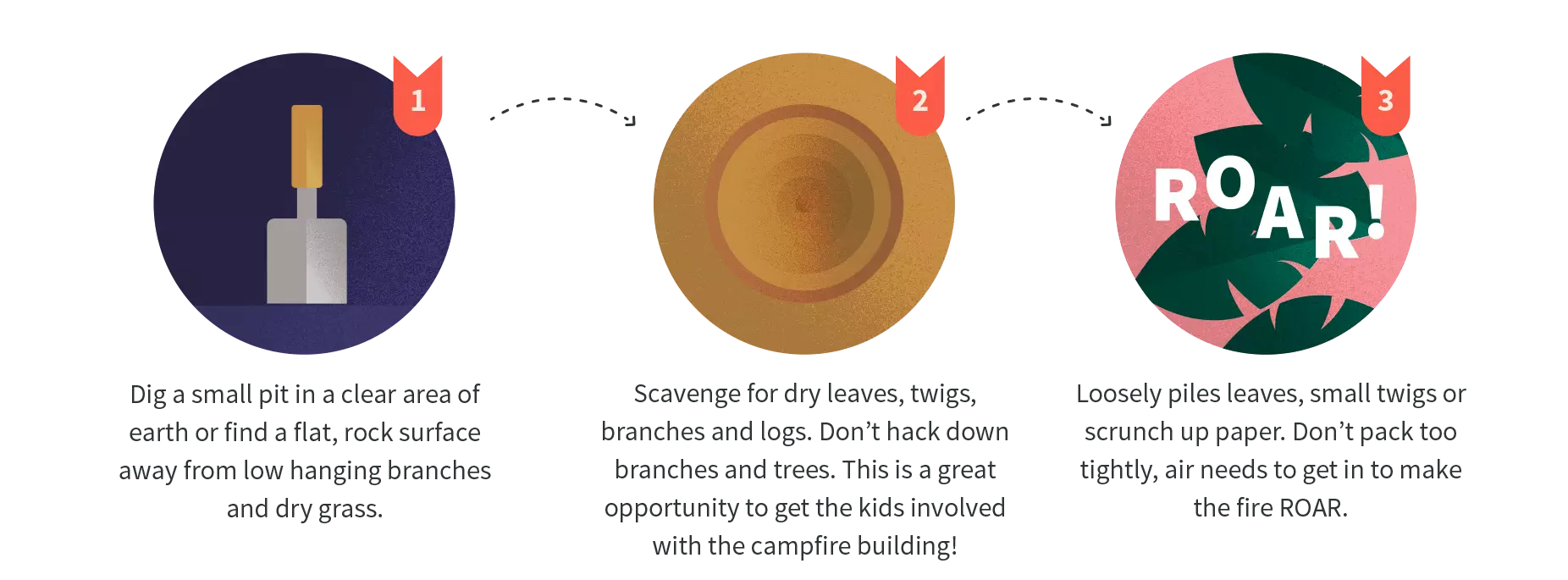
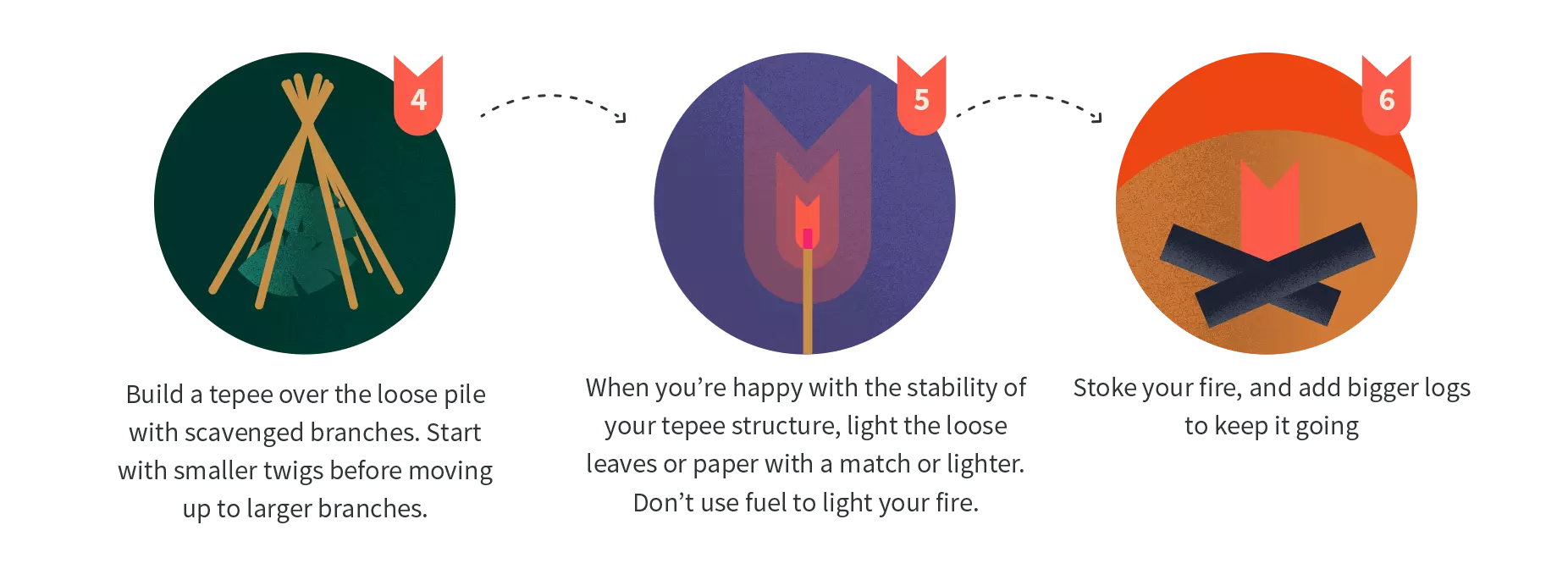

5 Camping Safety Tips
Like all activities, camping comes with potential risks which could threaten your health or the smooth-running or your trip, so leave plenty of time to plan and take the necessary precautions. Accidents do happen, but by preparing each stage of your trip, you'll be able to minimise the risk and spend more time relaxing on your holiday to the great outdoors.
1. Take care with Cooking Stoves and Fire
All cooking stoves should come with detailed safety instructions, so make sure you read them to become familiar with how it works. Regular caravanners should have someone carry out an annual service of gas-powered cookers, and install a carbon monoxide alarm.
The focal point of a night spent sleeping under the stars, the campfire should be built and lit away from tents and sleeping areas. Consider the wind direction, and the potential for wind strength to increase and blow the fire towards nearby tents. You should be able to move back from the fire without any obstacles littering the area around the fire to avoid dangerous trips and falls.
Finally, extinguish and dispose of your fire correctly. Having an emergency bucket of water or earth on hand is a good idea, and take care to ensure children don't play near a fire which has been put out, the embers could still be very hot.
2. First Aid
The outdoors is unpredictable, and that is half the fun! Bring a well-stocked first-aid kit to deal with minor, cuts, scrapes, bumps and burns. Small injuries can cause discomfort and risk of infection if not disinfected and dressed appropriately.
3. Sun Protection
Just because we're in Britain, doesn't mean the sun can't catch you unawares! Bring a hat for every member of the family, little and large, to prevent the sneaky effects of sunstroke creeping up on anyone, as well as water and sweat-resistant sun cream. Sunburn can single-handedly ruin your trip, so be wise and keep the rays off to keep on smiling!
4. Stay hydrated
Keep a refillable water bottle on your person or nearby at all times, and regularly top up on H20, especially if you are undertaking in strenuous activities such as hiking, climbing or mountain-biking.
5. Know where you are
Plan ahead, and know where you are if you're embarking on a real weekend in the wild. Phone signal is temperamental in rural areas, so make sure you bring a map, and a compass, and familiarise yourself with the nearest villages. As part of your planning, you should take precautions against extreme weather, such as flooding and lightning storms, by identifying buildings and or high areas away from rising rivers to seek shelter.
Disposing of Waste, Properly
Ah, the toilet dilemma.
If you’re out in the woods or mountains, far away from anywhere to perch your bottom, the wild toilet is an essential practice of any eco-camper. Grab a trowel, dig a hole 6 to 8 inches deep, and do your business. Replace all the soil, ensuring you’ve buried your toilet tissue away too.
Voila – you’ve mastered the wild toilet!
Repackaging Rubbish
Don’t throw your waste in the fire or on the ground. Rule 101 of responsible camping is clearing up your rubbish. Not only will you enjoy an attractive campsite, but you’ll join the many rubbish warriors in saving our national parks and countryside from being permanently littered and ruined with crisp bags, sweet wrappers, and plastic bags. Zippy sandwich bags are great for packing away your bits of rubbish into a small package while keeping smells locked away. Stand on cans to flatten them, and pack all rubbish away as you go to avoid the wind whipping your packaging up into clingy branches!
How long does it take a banana skin to decompose? Some mind-boggling biodegrading facts:
- Banana Skin - 3-4 weeks
- Wool Sock - 1-5 years
- Cigarette Butts - 10-12 years
- Aluminium Can - 200-500 years
- Plastic Bags - 200-1000 years
Respect Ye Fellow Campers
We’re not here to trample all over your escape to the wilderness but responsible campers should consider the surroundings, and the people sharing your rural pitch, before settling down.
Noise pollution can disturb wildlife and fellow campers who are likely to be enjoying the serene escape to the wild and its peace and quiet. Many campers want to listen to the rustling of leaves in the wind and birdsong, and your loud campfire sing-a-longs might not be particularly tuneful, especially if you’ve drained all the beer cans you brought along with you! Many festival-goers are awake in the early hours, so considerate tip-toeing is probably unnecessary, but campsites often have a noise curfew to ensure everyone gets the chance to have a good night’s kip.
Set a good example, and keep clean and tidy too! Leaving your campsite and the facilities in the clean state you found them in will encourage everyone to follow suit, and enjoy tidy and attractive camping spots.
Handy Camping Guidebooks
Bikepacking by Laurance McJannet
If the thrill of a challenge is what pulls you out into the fresh air, Bikepacking is packed with epic adventures ready and waiting for you right here on your doorstep. Avid off-roader Laurence McJannet has shared his years of trail hunting to give you the knowledge you need to plan your own mountain bike adventure in the UK. A master of light packing, camping, and trail-seeking - Laurence proves with meticulous planning and the right kit, you can pedal off on your own wild, rugged adventure to find freedom in the outdoors, with little to no impact on the environment.
Bikepacking is available on Amazon: £16.99
Wilderness Weekends by Phoebe Smith
Phoebe Smith has made a career out of finding the remote corners of Britain to bed down and enjoy a secluded refuge in the wild, and her latest book, Wilderness Weekends, is a trusty guide for any camper prepared to pack light, strap up and hit the trail for a date with unpredictable mountains, moorland, and coastlines. Not only is the book generous in sharing the best wild camping spots, but it includes detailed maps, captivating photographs and practical advice to get you riled up and ready to be a brave explorer on a new venture into the (almost) unknown. The road may be long and your bag may be heavy, but you'll return feeling nourished and rewarded with the great sense of achievement that comes after an extreme adventure!
Wilderness Weekends is available on Amazon: £14.99
Pitch Up, Eat Local by Ali Ray and the Camping and Caravanning Club
A camping recipe cookbook with a difference, Pitch up, Eat Local is a celebration of rich, delicious British produce and campfire cheffing. There is something particularly primal about cooking over an open fire, and this book invites you to discover campsites with nearby farmer's markets, farm shops, pick-your-own farms and even a site or two with their own organic gardens. For big foodies who put campfire meals as the main event of the trip, this book is an essential guide to fuel your camping holiday with the good stuff.
Pitch Up, Eat Local is available on Amazon: £16.99
Useful Camping Information
Planning:
> The Camping and Caravanning Club - Holidays, Help and Advice
> Pitchup.com - Camping and Caravanning Sites
> vouchercloud - Camping Discount Codes and Vouchers
> Met Office - Weather Forecast
Activities:
> Pinterest - Camping Activities for Kids
> Ordnance Survey Maps - Walking, Running or Cycling
> National Trails - Walking and Hiking
Safety:
> The Royal Society for the Prevention of Accident's Camping Safety
So - there you have it! Our Responsible Camping Guide has hopefully given you a bunch of fresh, green ideas to pack up your troubles and step outside the next time you're longing for a break away. Rugged outdoor types, nature lovers, green-fingered families, and merry glamper campers alike can embark on a digital detox, and each get their fair share of fresh air and adventure while doing their bit for the planet. By keeping it clean, green and beautiful, we'll all be able to relish in the novelty of sleeping the under the stars for many more years to come.
Sources
Hoax or Fact